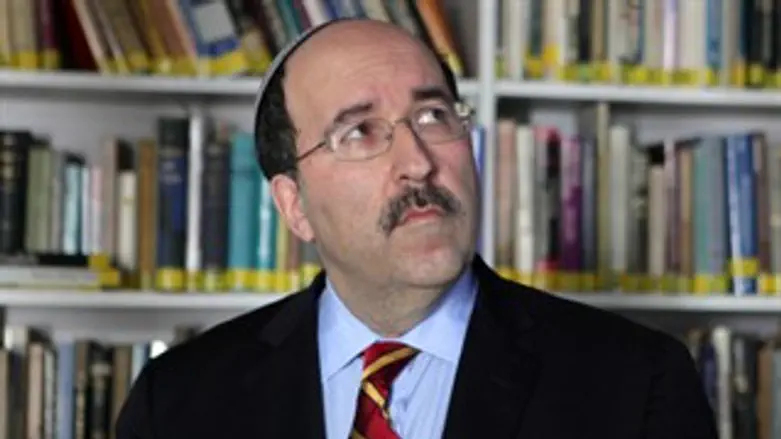
“Israel cannot count on Europe’s support when critical votes arise at the UN General Assembly. This was proven once again in the November 2012 vote by the General Assembly to grant the Palestinians Non-Member State Observer status. The only European state to vote against the Palestinian initiative was the Czech Republic. True, Germany, the Netherlands, and the UK were among the main European states to abstain; but Belgium, Cyprus, France, Greece, Italy, Portugal, and Spain all backed the Palestinian Arabs.
“It should be stressed that the EU signed the 1995 Oslo II Interim Agreement which legally prohibited unilateral acts of this sort, but it did not stop European states from voting with the Palestinian Arabs. Furthermore, for many years already, the UN General Assembly passes around 20 anti-Israel resolutions annually. The Europeans abstain in some cases, yet mainly support these resolutions, together with the Non-Aligned Movement (NAM).”
Dore Gold has been President of the Jerusalem Center for Public Affairs since 2000. He was Israeli ambassador to the United Nations from 1997-1999.
He continues: “To obtain a perspective on how Europe’s attitude toward Israel has deteriorated further in recent years, it is useful to look back at how Israel’s right to maintain secure boundaries was eroded with Europe’s assistance. After the Six-Day War in 1967, it was the UK that helped draft UN Security Council Resolution 242, calling for an Israeli withdrawal ‘from territories’ but not from ‘all the territories’ so that it could obtain ‘secure boundaries.’
“But once the UK joined the European Economic Community (the EEC) in 1973, its position on Israel’s rights tended to follow the European lead. The EEC issued a joint resolution on November 6, 1973, which insisted on a full Israeli withdrawal to the 1949 armistice lines. This ran counter to UN Security Council Resolution 242. European diplomacy has on occasion also sought to erode Israel’s claims in Jerusalem and even undermined Israel’s stand in its Western part.
“A similar European attitude was manifest at the Emergency Special Sessions of the General Assembly. They are convened when approximately ninety UN member states call for them. Such a session can take place at any time of year, not just when the General Assembly is in session from September to December. The UN is frequently unwilling to undertake measures against genocide. It did not succeed in convening the Security Council or Emergency Special Sessions of the General Assembly for Rwanda, or Darfur in the Sudan for instance.
“Yet Emergency Special Sessions have been used, with European support, to discuss extremely marginal issues for international peace and security which involve Israel. For instance in July 1997, the Arab states successfully convened such a Special Session of the General Assembly. It dealt with Israeli building practices in East Jerusalem at Har Homa, a barren hill. In the UN’s entire history, about ten Emergency Special Sessions were convened. Often, the same session was reconvened a number of times. Almost all dealt with the Middle East and Israel.
“I was Israeli Ambassador at the UN when the aforementioned Emergency Special Session convened to discuss Har Homa. I researched whether it convened when the Soviets invaded Afghanistan or Czechoslovakia, when Vietnam invaded Cambodia, Turkey invaded Cyprus, India invaded Pakistani territory, or Morocco invaded the Western Sahara.
“It turned out that in about fifty years of the Fourth Geneva Convention’s existence, the international community had never recommended the convening of its High Contracting Parties concerning any conflict. The only case that remains until today is the building of condominiums on a Jerusalem hill. This session was decided on with full European support. Additionally, this assault has led to the politicization of international humanitarian law, and the undermining of international conventions.
“Many people have been under the illusion that Israel’s relations with the United Nations—and therefore also European voting patterns therein—actually improved in the 1990’s during the period when the Oslo Agreements were implemented. One of the first things I did when I arrived in New York in 1997 was to take out the thick books of voting patterns to see how various UN members voted on critical issues relating to Israel.
“My findings were completely contrary to this myth of a wonderful Israeli romance with the UN during the 1990’s. The first Oslo Agreement was signed on 13 September 1993. Within three months and one day from the signing, on 14 December 1993, the UN General Assembly began to adopt its usual series of anti-Israel resolutions.
“In July 2004, the General Assembly adopted a resolution supporting the advisory opinion of the International Court of Justice on the separation fence Israel was building. One might have expected that the EU would abstain in that vote. Under French leadership, the European Union voted for this resolution.
“The Europeans have longstanding and far-reaching double standards regarding how they deal with Israel on one hand, and the Arab world on the other. They apply pressure on Israel and tread lightly on radical Arab or Islamic states. From there to demonizing the entire Jewish people is but a short step. This process binds anti-Zionism and attacks on the legitimate rights of the Jewish people, with anti-Semitism. The basis of this perception has been laid with the support of the EU.
“The European position at the UN is not only an important indicator of European political unfairness toward Israel, but also of its moral bankruptcy. Europe is never able to present Israel with a remedy for its security situation.
"It is hard to understand the source of this European intellectual weakness. I always wondered whether this was out of political convenience, or whether they truly believe it.”
Ambassador Gold concludes: “Ancient Christian anti-Semitism is based on theological arguments. Modern anti-Semitism rests on political argumentation. Yet, both employ classic false charges against the Jewish people.”